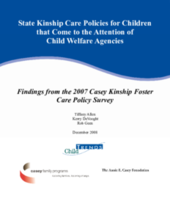Federal and state policies in the United States give preference to relatives as foster parents to care for children taken into state custody. Increasingly, however, states are using relatives to care for abused and neglected children to avoid having to take children into custody, according to a new Child Trends study, State Kinship Care Policies for Children that Come to the Attention of Child Welfare Agencies: Findings from the 2007 Casey Kinship Foster Care Policy Survey. When children are not taken into state custody, child welfare agencies offer significantly less financial and other assistance.
The study summarizes key findings from the most recent survey of states' kinship care policies. The survey reveals that there is a lack of consensus among states about how and when to rely on relatives to care for abused and neglected children and the appropriate level of financial assistance, support services, and supervision to give to children and kin. Among the findings:
-
Foster children and those caring for them are eligible for much greater support than the children and caregivers diverted from the system.
-
Ongoing financial assistance for relatives is less (if available at all) when children are diverted from foster care. Children in state custody are typically supported by monthly foster care payments, but relatives caring for children not in foster care must apply for less generous financial assistance through the welfare system.
-
Only 14 of the 39 states that allow the use of relatives to divert children from foster care routinely maintain ongoing supervision of the children removed from their parents' homes.
-
While states will typically refer relatives for a variety of services, the direct provision of services by child welfare agencies for these relatives and children is infrequent.
-
Relatives often receive less financial support than non-relatives when they become foster parents and care for children in state custody. In 22 states, at least some relative foster parents may be denied ongoing foster care payments because they are unable or fail to complete the required licensing process.

